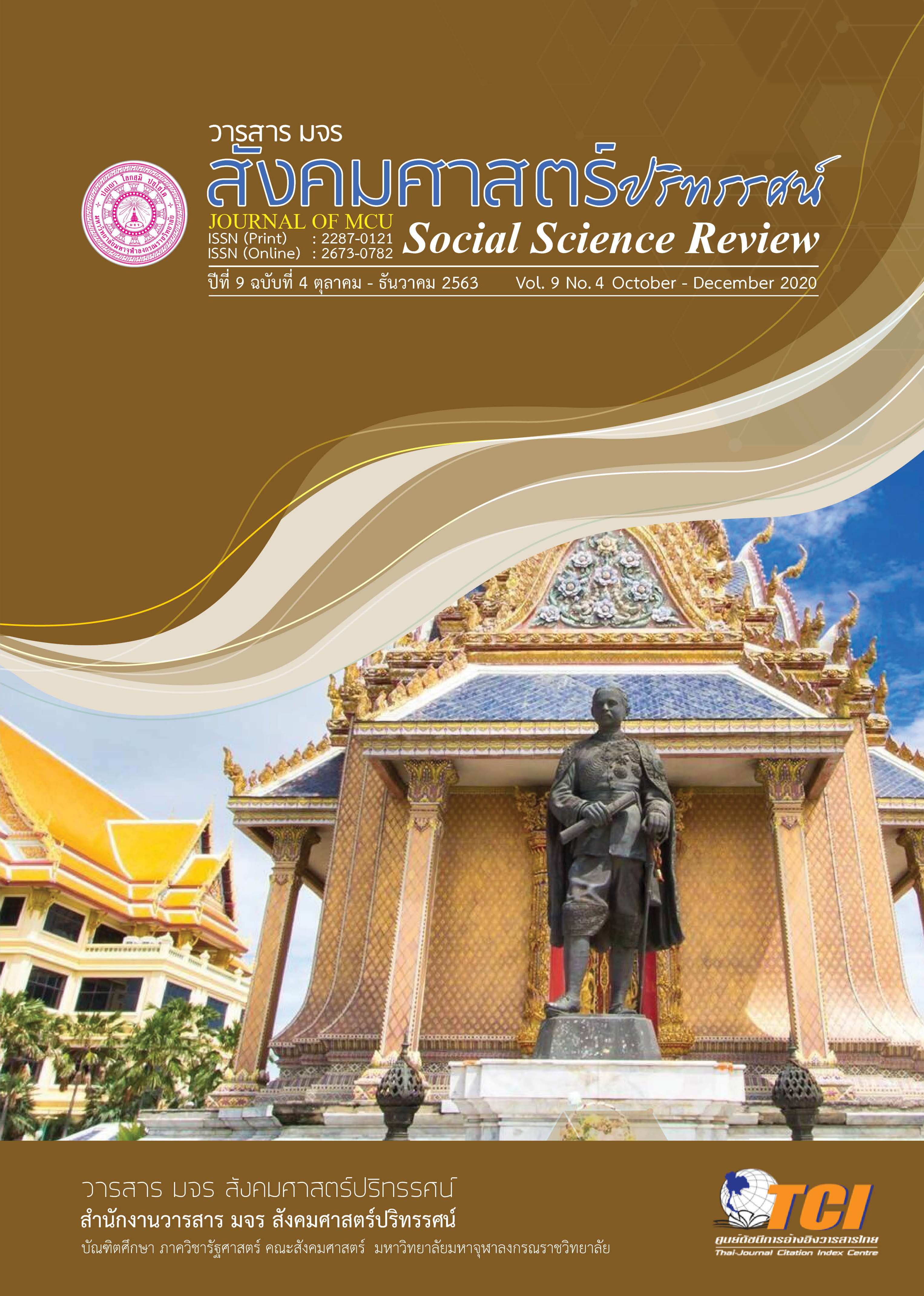โมเดลความสัมพันธ์เชิงสาเหตุประสิทธิผลการบริหารงานของกรมแพทย์ทหารบก
คำสำคัญ:
ความสัมพันธ์เชิงสาเหตุ, ประสิทธิผล, ทศพิธราชธรรมบทคัดย่อ
บทความวิจัยนี้มีวัตถุประสงค์เพื่อศึกษาประสิทธิผลการบริหารงาน ปัจจัยความสัมพันธ์เชิงสาเหตุ และนำเสนอโมเดลความสัมพันธ์เชิงสาเหตุของประสิทธิผลบริหารงานของกรมแพทย์ทหารบกที่มีประสิทธิผล การวิจัยในครั้งนี้เป็นการวิจัยแบบผสานวิธี การวิจัยเชิงปริมาณ ใช้กลุ่มตัวอย่าง 430 คน วิเคราะห์ข้อมูลโดยใช้สถิติ ความถี่ ร้อยละ ค่าเฉลี่ย ส่วนเบี่ยงเบนมาตรฐาน และค่าสถิติไคสแควร์ และการวิจัยเชิงคุณภาพด้วยการสัมภาษณ์เชิงลึกกับผู้ให้ข้อมูลสำคัญ 17 รูปหรือคน ผลการวิจัยพบว่า 1. ประสิทธิผลการบริหารงานในภาพรวมอยู่ในระดับมาก (=3.95, S.D.=0.489) 2. ปัจจัยความสัมพันธ์เชิงสาเหตุที่มีต่อประสิทธิผลการบริหารงานของกรมการแพทย์ทหารบก ได้แก่ปัจจัยด้านการบริหารและการบูรณาการทศพิธราชธรรม ซึ่งมีอิทธิพลทางตรงร้อยละ 72 และอิทธิพลทางอ้อมร้อยละ 12 และ 3. การสังเคราะห์จากผลการวิจัย ได้แนวคิดการบริหารงานแบบมีภูมิคุ้มกัน ซึ่งเป็นการบริหารงานโดยใช้หลักธรรมที่สำคัญๆ มาเป็นแนวทางในการบริหารงาน ได้แก่ ความยุติธรรม ความซื่อสัตย์ เพียรพยายาม และการเสียสละ หรือโดยรวมเรียกว่า หลัก JHAS ซึ่งหากการบริหารงานยึดถือปฏิบัติตามหลักธรรมดังกล่าวแล้วจะทำให้ การบริหารงานขององค์กรนั้น ประสบผลสำเร็จ อีกทั้งยังเป็นเกราะป้องกันในการกระทำผิดกฎหมายด้วย
เอกสารอ้างอิง
กรมแพทย์ทหารบก. (2560). บันทึกข้อความ ที่ กห 0446.15/327 ลง 9 ส.ค. 60. เรื่อง ขออนุมัติยุทธศาสตร์ กรมแพทย์ทหารบก พ.ศ.2560 – 2564.
กองยุทธการและการข่าว กรมแพทย์ทหารบก. (2562). ภารกิจการจัดหน่วยกรมแพทย์ทหารบก. สืบค้น 12 ธันวาคม 2562, จาก http://www.amed.go.th/2013-06-20-07-01-33.
กองยุทธศาสตร์ กรมแพทย์ทหารบก. (2562). แผนยุทธศาสตร์ กรมแพทย์ทหารบก. สืบค้น 12 ธันวาคม 2562, จาก http://www.amedstgy.com/strategicmap
ณัฐปราย์ ชัยสินคุณานนต์. (2561). การบริหารงานเชิงกลยุทธ์ขององค์การบริหารส่วนตำบลในเขต อำเภอเมือง จังหวัดชัยภูมิ. วารสาร มจร สังคมศาสตร์ปริทรรศน์, 7(3), 260 – 272.
ถนัด ไชยพันธ์. (2561). การประยุกต์ใช้หลักพุทธธรรมเพื่อการส่งเสริมประสิทธิผล ในการบริหารงานขององค์กรปกครองส่วนท้องถิ่น จังหวัดอุบลราชธานี. วารสาร มจร สังคมศาสตร์ปริทรรศน์, 7(3), 76 – 89.
ปกรณ์ มหากันธา. (2559). รูปแบบและกระบวนการบริหารองค์กรปกครองส่วนท้องถิ่นเชิงพุทธบูรณาการ (วิทยานิพนธ์ปริญญาพุทธศาสตรดุษฎีบัณฑิต สาขาพระพุทธศาสนา). พระนครศรีอยุธยา: มหาวิทยาลัยมหาจุฬาลงกรณราชวิทยาลัย.
พระเมธีธรรมาจารย์ (ประสาร จนฺทสาโร). (2561). ปัจจัยที่มีผลต่อประสิทธิผลการพัฒนานักบริหาร มหาวิทยาลัยมหาจุฬาลงกรณราชวิทยาลัย. วารสาร มจร สังคมศาสตร์ปริทรรศน์, 7(3), 147 – 162.
พระเมธีธรรมาภรณ์ (ประยูร ธมฺมจิตฺโต). (2539). คุณธรรมสำหรับนักบริหาร. กรุงเทพฯ: มูลนิธิพุทธธรรม.
พุทธทาสภิกขุ. (2549). ทศพิธราชธรรม. กรุงเทพฯ: สุขภาพใจ.
มหาวิทยาลัยมหาจุฬาลงกรณราชวิทยาลัย. (2539). พระไตรปิฏกฉบับภาษาไทย ฉบับมหาจุฬาลงกรณราชวิทยาลัย. กรุงเทพฯ: โรงพิมพ์มหาจุฬาลงกรณราชวิทยาลัย.
สุนทรี สุริยะรังษี. (2560). การศึกษาแนวคิดและวิธีปฏิบัติของเครือข่ายบัณฑิตอาสาในภาคเหนือ (รายงานการวิจัย). เชียงใหม่: มหาวิทยาลัยมหาจุฬาลงกรณราชวิทยาลัย วิทยาเขตเชียงใหม่.
สุนันทา สุเทศ. (2561). ความเป็นองค์การแห่งการเรียนรู้กับประสิทธิผลการพัฒนาองค์การและบุคลากรของ โรงเรียนนายร้อยตารวจ. วารสาร มจร สังคมศาสตร์ปริทรรศน์, 7(3), 178 – 192.
Fayol, H. (1930). Industrial and General Administration. New York: Mc-Grew Hill.
ดาวน์โหลด
เผยแพร่แล้ว
รูปแบบการอ้างอิง
ฉบับ
ประเภทบทความ
สัญญาอนุญาต
ลิขสิทธิ์ (c) 2020 วารสาร มจร สังคมศาสตร์ปริทรรศน์

อนุญาตภายใต้เงื่อนไข Creative Commons Attribution-NonCommercial-NoDerivatives 4.0 International License.
เพื่อให้เป็นไปตามกฎหมายลิขสิทธิ์ ผู้นิพนธ์ทุกท่านต้องลงลายมือชื่อในแบบฟอร์มใบมอบลิขสิทธิ์บทความให้แก่วารสารฯ พร้อมกับบทความต้นฉบับที่ได้แก้ไขครั้งสุดท้าย นอกจากนี้ ผู้นิพนธ์ทุกท่านต้องยืนยันว่าบทความต้นฉบับที่ส่งมาตีพิมพ์นั้น ได้ส่งมาตีพิมพ์เฉพาะในวารสาร มจร สังคมศาสตร์ปริทรรศน์ เพียงแห่งเดียวเท่านั้น หากมีการใช้ภาพหรือตารางหรือเนื้อหาอื่นๆ ของผู้นิพนธ์อื่นที่ปรากฏในสิ่งตีพิมพ์อื่นมาแล้ว ผู้นิพนธ์ต้องขออนุญาตเจ้าของลิขสิทธิ์ก่อน พร้อมทั้งแสดงหนังสือที่ได้รับการยินยอมต่อบรรณาธิการ ก่อนที่บทความจะได้รับการตีพิมพ์ หากไม่เป็นไปตามข้อกำหนดเบื้องต้น ทางวารสารจะถอดบทความของท่านออกโดยไม่มีข้อยกเว้นใดๆ ทั้งสิ้น





